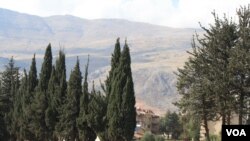In some of the most volatile parts of Lebanon where a constant flow of refugees cross the border from Syria, one industry continues to flourish against the odds.
Lebanese winemakers say because they survived a brutal civil war in the 1970s and 1980s, they can survive anything.
Like fellow winemakers in the region, Ramzi Ghosn, one of the owners of Massaya, a small winery in Lebanon’s Bekaa Valley, says exporting their product also means exporting their culture.
“You know, wine is not about just a product. It’s about the people behind the wine that makes a difference," said Ghosn.
Ghosn says he was born during the throws of Lebanon’s civil war and, like many young people, he left the country to study and work abroad.
"But instead of settling abroad, we decided to come back to our country because we think we have a different culture, a different personality here," he said.
By making uniquely Lebanese wines he shows buyers Lebanon’s unique beauty, which is usually overshadowed in the news by conflicts in the Middle East.
And Lebanon’s own history of war, he says, is what makes winemakers here resilient enough to keep doing business, despite the battles in nearby Syria.
“Damascus is just 15 minutes away over these mountains. We saw wars. I mean, I’m terribly sorry for the people who are suffering there. But I think as Lebanese we saw dire situations and we overcame them. So you have to adjust your business plan accordingly," said Ghosn.
Across the street from the vineyard is a makeshift refugee camp where families crowd into handmade tents, a stark reminder of just how much plans have changed for businesses in Bekaa since the Syrian war began in the early spring of 2011.
Most of the more than 1 million Syrian refugees in Lebanon — a country of fewer than 5 million people — live here in Bekaa, stretching its land and economy to the limit.
But at one of Lebanon’s oldest and largest wineries, Domaine des Tourelles, co-owner Faouzi Issa says the wine business is thriving, with Lebanese wines gaining international acclaim and dozens of wineries opening their doors in recent years.
Still, he says, to expand further into international markets, Lebanese winemakers first have to let buyers know Lebanon makes wine at all.
“That’s the game I think Lebanese wines has to play everywhere in really tackling all the markets that have enough experience in wine tastings. And tell them, yes, Lebanon is not only a country that has the current problems. No, we have beautiful wines and people that can produce great wines that can be exported everywhere," said Issa.
But the industry is not immune to the war next door, he adds. With tourism down, his plans to open a hotel by the vineyard are stalled until the conflict ends.
“We thought that within two months everything would be solved," he said. "It’s becoming more and more severe."
Lebanon produces 9 to 10 million bottles a year, which is tiny compared to giants like France, which produces seven to eight billion bottles a year.
But winemakers here say they aren’t trying to compete with Europe.
Their wine, like their country, is different from any other in the world, they say.














